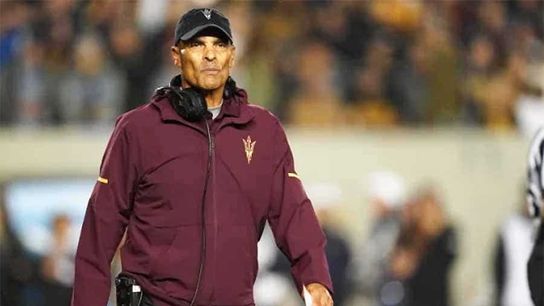It's kind of a funny thing when you stop to think about it. Head coaches trust their livelihoods to the assistants they hire and the players they recruit, but they won't trust them to talk to the media.
Take, for instance, the case of Iowa State and its quarterback Brock Purdy. Off to a 1-3 start last September, the Cyclones turned to the true freshman to turn their season around -- and Purdy did just that, leading Iowa State to wins in seven of their last eight regular season games. At Oklahoma State, at Texas, against West Virginia, Iowa State head coach Matt Campbell trusted Purdy to start at quarterback but, because he was a freshman, didn't allow him to speak to the media afterward.
Contrast that with Arizona State head coach Herm Edwards, who signed three quarterbacks in his 2019 class and allowed each of them to speak to the media upon arriving to campus.
"You have to develop their skills, not only on the field but off the field," Edwards told the Arizona Republic. "First game of the season, whoever the starting quarterback is, he’s going to have to step out there and do it.
"Coaches? They can talk. I tell them: 'Just make sure before you open your mouth you’ve researched what you’re about to say. Don’t just say stuff. And if you don’t have anything good to say, don’t say anything.'"
The calculus for the restrictive set of coaches is easy to see: the more opportunities players and assistants have to speak to the media, the more opportunities they have to say something dumb, which would create a distraction, and distractions equal instant death for a football program.
And, sure, there is a risk of saying something regrettable. Edwards opened his own Sun Devils tenure with a viral gaffe -- and lived to tell about it.
But weighing only the risk ignores the upside, for the player and the program.
For one, the better relationship the media is able to build with players and coaches, the more opportunities they have to tell positive stories about the program.
Furthermore, if head coaches are really educators, well, speaking to the media is a skill that benefits players and coaches alike to learn. If you're a head coach who wants to empower your assistants to become head coaches of their own one day, isn't it incumbent upon you to give them reps in front of the cameras? And in a sport where the vast majority of players will go pro in something other than football, doesn't speaking to the media give players a valuable opportunity to build a bond with their fan base -- one that will benefit them down the line?
If a football program's ultimate role is to shine a positive light upon the university it represents, then speaking to the media isn't an annoying side quest, it's is an essential part of that mission.
"You have to trust them," Edwards said. "These players know I trust them, and the coaches know I trust them. I have no hidden agenda. I’m trying to help them be good men, be a great student, and be a really good teammate. That’s the deal here."
Think about it: if it's third-and-goal in a tie game with 30 seconds to play, the head coach is more than willing to trust his assistants to make a play call and his players to execute said call. If that's the case, why wouldn't you trust them to talk about it afterward?
